Epigenetics in context
1/21
Earn XP
Description and Tags
remember, nutrition can have an impact on epigenetics
Name | Mastery | Learn | Test | Matching | Spaced |
|---|
No study sessions yet.
22 Terms
how does the maternal diet during pregnancy affect genetics?
different diet during pregnancy
nutritional supplementation
she could be undernourished or overnourished
This therefore has the following effects/changes in…
DNA methylation
histone post-translational modifications
Therefore changes the gene expression for several target genes
such as changes in fat deposition and energy homeostasis in offspring (and future generations)
what is basically happening in epigenetics?
some genes are switched on and some switched off
bases stay the same but the message changes as DNA is modified
there are 3 main mechanisms that occur - which dont happen in isolation (could happen at the same time or after each other)
DNA methylation
Modification of histones
noncoding RNA
so what is DNA methylation?
shutting genes off - nurture can reverse
it is the tagging of specific points in the DNA molecule with a methyl group - this process usually silences genes
stem cell differentiates into its final form - shuts off genes suitable only for other cell types
inherited daughter cells (differentiation) with the silenced gene
effects are also reversible
helps creatures change when their surroundings change
changes in a chromosome without alterations in the DNA sequence
on a chemical level, it is the addition of the methyl group at the 5 position of the pyrimidine ring of cytosine, creating 5-methylcytosine (5-mC)
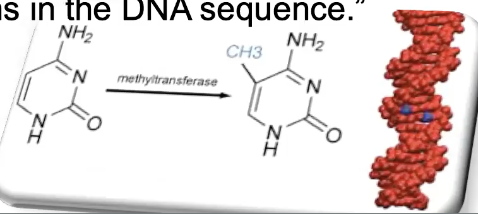
what was the dutch famine
long-term effects of the Dutch hunger winter
7 months - by Nazis
mothers starved in first 3 months
less DNA methylation of the insulin-like growth factor II (IGF2) gene - major gene for foetal growth and development
methylation was normal in people exposed as older foetuses
what is the mechanism of epigenetics
diet/drugs/chemically
modify dna
modify histones
adjust their shape
to make segments of DNA available
methylation typically decreases gene expression cos it silences the gene
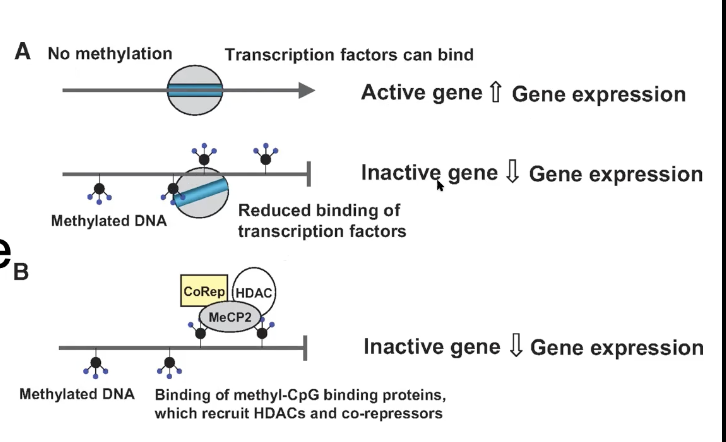
modification of histones
(histones are specialised proteins involved in gene regulation)
histones are made when DNA strands are organised and compacted into chromatin/proteinDNA complexes to safeguard the DNA and make it available or not
the chromatin structure can change when histone proteins are chemically modified - by adding or subtracting a methyl group, acetyl group or other chemical tags
histone methylation characteristically tightens up DNA, restricting access to genes
acetylation unravels DNA, making genes more available for activation
epigenetic modifications in histone structures occur within the liver as a result of heavy binge drinking
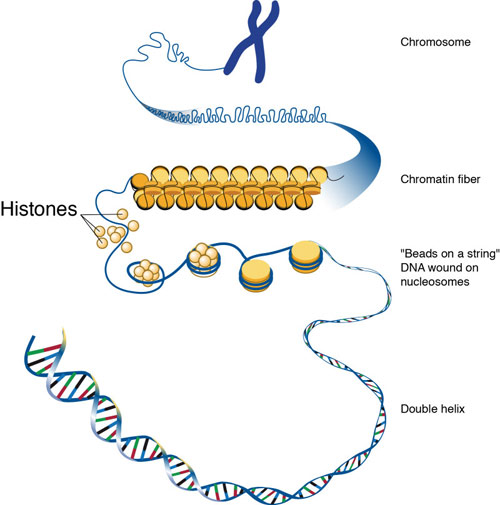
why is modification of histones significant to DNA modification hence epigenetics?
if a histone is now tightened because of methylation, DNA is less accessible for transcription
to fix this, there can be reversible modifications on their N-terminal tails
there are 8 areas on the histone to allow modification:
acetylation, methylation, phosphorylation, ubiquitylation, sumoylation, ADP ribosylatiom, deimination and proline isomerisation
Histone modification regulates different functions including
transcription
DNA replication
repair
what is directly affected from diet when modifying histones?
the chromatin
chromatin is made of histones and DNA - specifically it is a string of nucleosomes consiting of DNA wrapped around histones
8 histone proteins = nucleosome
histone modification can impact gene expression by altering chromatin structure
e.g. a high fat, low carb diet could open up chromatin and improve mental ability via histone deacetylase inhibitors
what is non coding RNA (ncRNAs)
we found that they regulate gene expression at the transcriptional and post-transcriptional level
90% of a complex genome is transcribed - not into proteins, but into noncoding RNA (so they arent translated into proteins obvs)
nonfunctional DNA is primarily involved instead, particularly in the regulation of gene expression and is transcribed into ncRNAs
non coding RNA determines the sex of offspring; by shutting down the 2nd X chromsome on female
(only 2% of whole genome is translated into protein)
what is the actual definition of epigenetics
change in phenotype not genotype
study of changes in the regulation of gene activity and expression
that are not dependent on gene sequence (cos methylation etc, so not actual sequences of bases)
there can be heritable changes in gene activity and expression (in the progeny of cells or of individuals) BUT not necessarily heritable if the changes are short term (can be reversed) - only if they are stable, long term alterations
summarise epigenetic processes
dont act independently
DNA (de)methylation
chromatin remodeling
ncRNAs
can fine tune gene expression
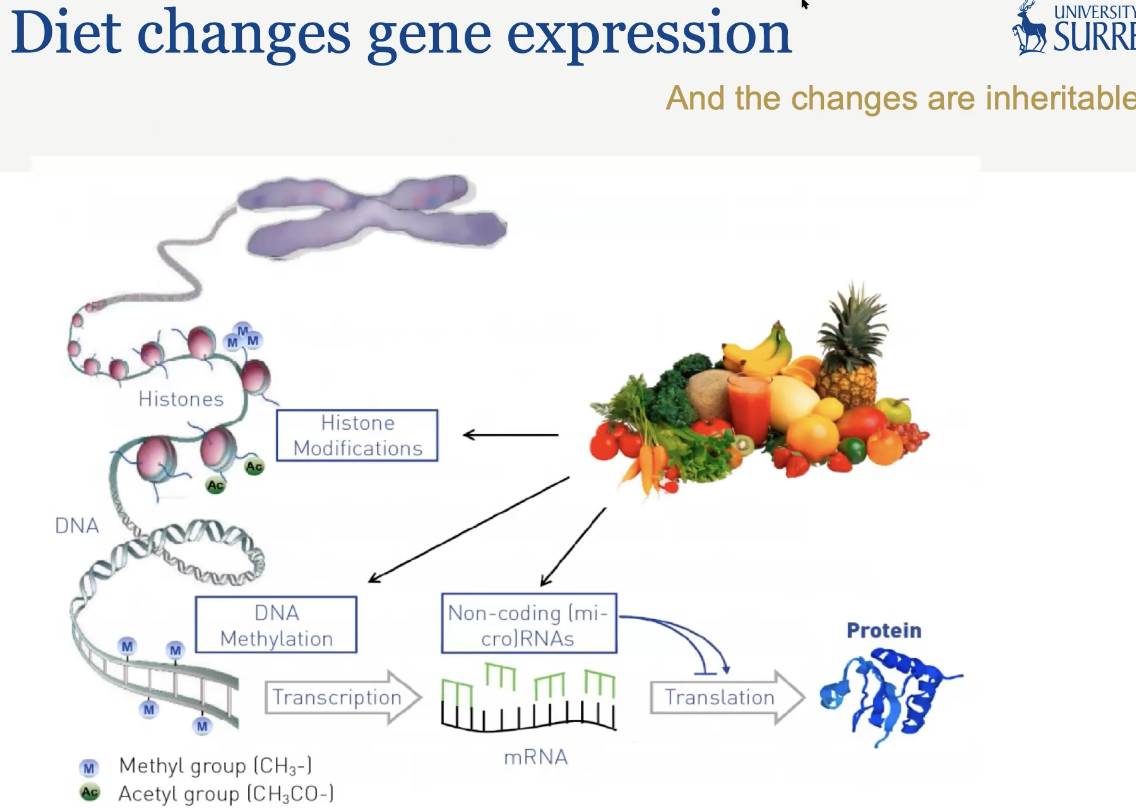
summarise the environmental effects on animals
diet and nutrients have direct and indirect effects
interaction of genetic differences and prenatal environment
25% of the epigenetic variation between babies- genetic differences alone
75% of variation = interaction of genetic differences and the prenatal environment
most of the variation between babies isnt due to fixed genetic changes
most of them are actually due to interactions between the babies’ environment in the womb and genetic info passed down from the parents
what happens if nutrition is poor/inappropriate in utero?
you disturb cell proliferation and therefore cause irreversible changes in tissue structure
you alter patterns of epigenetic remodelling → changes in gene expression
leading to changes in physiological function
can cause disease risk later in life
why shoudl we pay attention to metabolic capacity in epigenetics?
every animal and individual has their metabolic capacity/load - when you don’t give the right nutrients/ or give too much food, it can lead to morning sickness or diseases developing later on in life for the baby
prenatal (foetal) and postnatal stages of development
tell me about what typically happens with mummy dogs
owners typically feed them pre and/or post-natal high calorie diet when they dont need to
this leads to animal babies like puppies being born with elevated blood pressure, adiposity (so more fat cells in relation to muscle cells), and insulin resistance (mice)
being overweight in childhood is a good predictor of excess fat mass as an adult
recent data demonstrates a 16-fold increase in the prevalence of the metabolic syndrome in overweight adolescents compared with normal-weight peers
SO…
mothers who are obese maintain elevated concentrations of glucose and NEFA
induces epigenetic changes
possible permanent changes in appetite control, neuroendrocrine function, fuel metabolism and energy partitioning during early development
leads to greater adiposity and risk of obesity in later life
what was the impact of post war dutch famine
undernutrition in utero lead to insulin resistant babies, so they grew up to be more prone to obesity, hypertension, CHD and glucose intolerance and hence died earlier
this is because excess fat cells were deposited rather than distrubuting equally to tissues which need it
what happens if you give a rat low protein diet
total pancreatic weight decreases
pancreatice B cells decrease
impaires glucose homeostasis (cos B cells produce insulin so less of that means glucose isnt well regulated anymore)
what happens if you give a sheep low protein diet
increase in maternal cortisol in late gestation (cos it stressed them out)
increase in insulin resistance post-natally
decrease methylation (less genes switched off) or increase exposure to glucorticoids changes foetal tissue structure
what is the metabolic adaptation to poor nutrition in horses?
pregnant mum doesnt have enough grass to feed on
so her foal is now preprogrammed not to expect a lot of nutrition (born lean)
so as soon as they have food, their body prepares to take as much of that as possible to lay it out at adipose tissue so when they go back to little nutrition period they use the stored fat to burn it off and stay alive
how does insulin resistance arise in starvation?
becomes a means of adaptation - acc a good thing in some way
cos it minimizes energy loss and facilitates energy storage in the form of fat during spring and summer
helps survival during a subsequent winter famine
high insulin resistance diverts more energy to the insulin independent tissues (brain) and less to insulin dependent tissues
cosidered a thrifty gene - allows animal to survive when food is scarce
remember pregnant doestn mean you should overfeed
image shows a metabolically loaded foal (almost 200% requirement of energy) and deficient in some minerals (optimal is 100%)
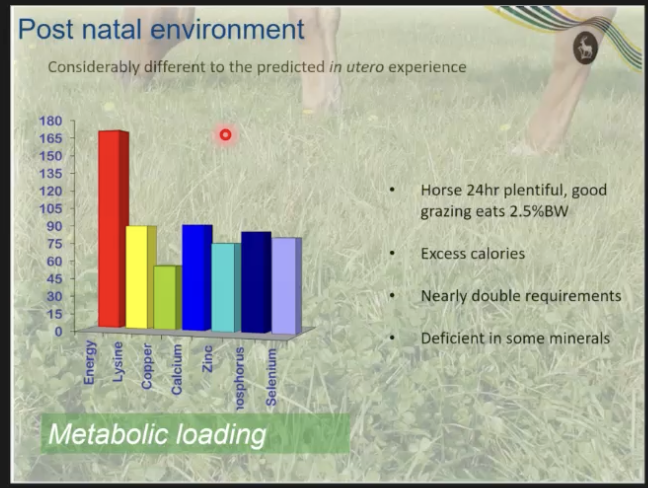
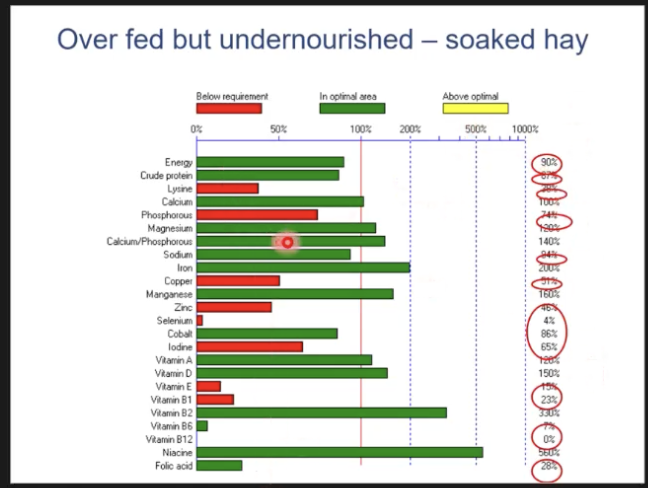
what do these images show
you need to be careful how you feed the animal
e.g. soaking hay means you depleting/diluting the minerals from the hay so become undernourished
you can be overfed and undernourished
remember, nutrients have direct effects on genes
B vitamins - folate and B12 might be beneficial if high blood levels of homocysteine
increase in antioxidants decrease DNA methylation
micronutrients are just as important as calories
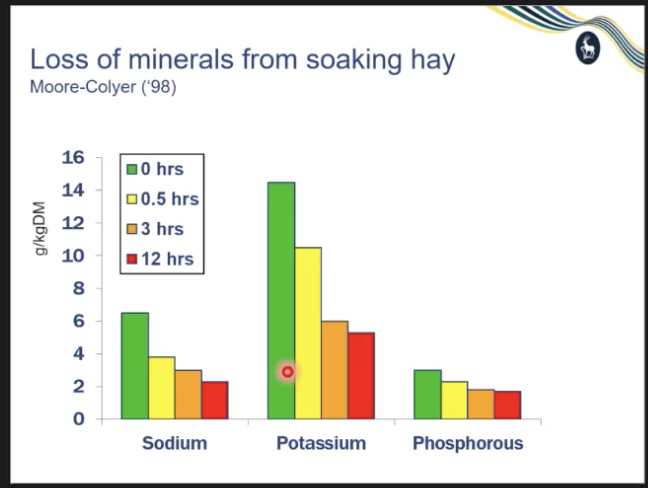
summary
owners are changing the biology of their horses
epigenetic changes due to
overfed but undernourished
often excess calories but poor quality protein
underfed vitamins and minerals
restriction of forage (hay/grass) decreases fermentation in the hind gut
redues B vitamin production
restricted grazing decreases antioxidant intake (fresh grass high in Vit E, flavonoids and phenols)